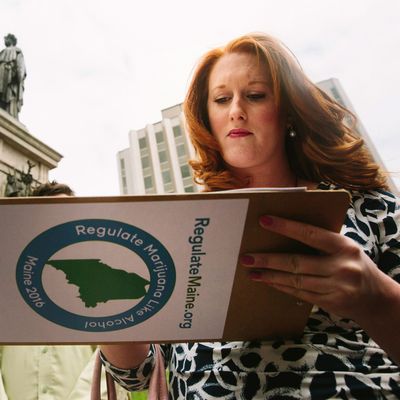
A little over a week ago, progressives dreamed of drowning Donald Trump in a great blue wave. As Hillary Clinton opened up double-digit leads in several national polls, it became possible to imagine Democratic control of both houses of Congress — and with it, actual legislative gains on progressive priorities for the first time since 2010.
But then upscale Republicans started deciding that they’d rather elect a madman than risk a tax hike. And James Comey announced a sequel to the Clinton emails saga.
Now progressives just hope that Hillary Clinton will have enough votes in the Senate to appoint a cabinet — or else that the most dangerous reactionary in modern American history won’t gain access to the nuclear codes.
But whatever happens at the federal level, the progressive agenda is almost certain to be advanced on Election Day, via a series of state-level ballot initiatives. Here are three outcomes that liberals should be able to celebrate on November 9, even if the republic falls into the (tiny) hands of a racist tyrant.
1. A growing epidemic of reefer pragmatism.
If current polling holds up, the number of states with legal, recreational marijuana will double next Tuesday. At present, California, Maine, Nevada, and Massachusetts all appear poised to reject cannabis prohibition, although polls remain close in the latter two states.
Arizona is also considering legalization, and recent surveys show the pro-side garnering a plurality of support. But at the moment, it seems unlikely that the proposition will gain the majority it needs to be enacted.
While some progressive nanny-staters may fret the implications that legal weed could have for public health, there’s broad consensus in blue America that arresting people for indulging in a substance less harmful than alcohol is bad public policy. Beyond curbing one of our justice system’s many sources of racial disparity, legalizing marijuana also shrinks the market share enjoyed by criminal enterprises. (What’s more, there is at least some evidence that the availability of legal weed has a negligible effect on public health, and may even lessen the frequency of opioid overdoses).
Progress toward legalization on the state level will likely force federal reform. If all five of next week’s ballot measures pass, 75 million Americans will live in states where recreational marijuana is legal on the local level, but illegal on the federal one. That tension will be difficult to maintain in the long term.
As the number of states with legal marijuana markets grows, the power of the pro-legalization coalition is almost certain to expand, as stoners and criminal-justice reformers are joined by an expanding number of businesses and banks whose profit margins are dependent on a laissez-faire DEA.
Heck, even the gun lobby might start rallying around Americans’ right to bear blunts. Per Vox:
Federal firearm law prohibits persons who are unlawful users of controlled substances from purchasing firearms. In those states where marijuana is legal, marijuana-using citizens are faced with a choice: Either lie about their marijuana use on their gun-permit application, which is a felony punishable by up to five years in prison, or do not purchase a gun. The Ninth Circuit recently ruled that just having a medical marijuana card, but not using the drug, is sufficient to prohibit someone from purchasing a gun.
2. The enactment of “common sense” gun-control laws.
While regulating firearms has proven impossible on the federal level, Nevada, California, Maine, and Washington are all on pace to pass tougher gun laws next Tuesday. In the Silver State, the measure would require firearm transfers to go through a licensed gun dealer, except in instances of a temporary transfer or of a gift between immediate family members. Mainers are considering a similar expansion of background checks.
In California, voters are likely to ban large-capacity magazines and require certain individuals to pass background checks before buying bullets, while Washington is set to allow judges to issue temporary violence restraining orders to deny people who are found to be a danger to themselves or others access to firearms.
Current polls show all of these measures passing, although Nevada’s is more hotly contested than the others.
3. Raises for some of America’s lowest-paid workers.
Most states already have hourly minimum wages higher than the federal rate of $7.25. But polls suggest that Maine, Arizona, Colorado, and Washington are likely to raise their minimums far past that pittance next Tuesday, phasing in an hourly wage floor of $12 or more (depending on the state) by 2020.
However, teenagers in South Dakota may see their wages move in the opposite direction. Two years after raising the state minimum wage to $8.55, the Mount Rushmore State will vote on whether to kick that rate down a dollar for workers under 18 (the ostensible idea being that a lower wage would boost youth employment).
And direct democracy is likely to disappoint liberals in other ways next Tuesday. Colorado will almost certainly reject single-payer health care; Nebraska and California appear inclined to vote against the abolition of the death penalty; and Washington’s carbon tax could very well be defeated by a motley coalition of fossil-fuel interests and left-wing activists.
Nonetheless, if polls can be believed, America will have less marijuana prohibition, more gun control, and higher minimum wages a week from now than it does today. Which may be the closest thing to “change you can believe in” that progressives will get for a good while.






























